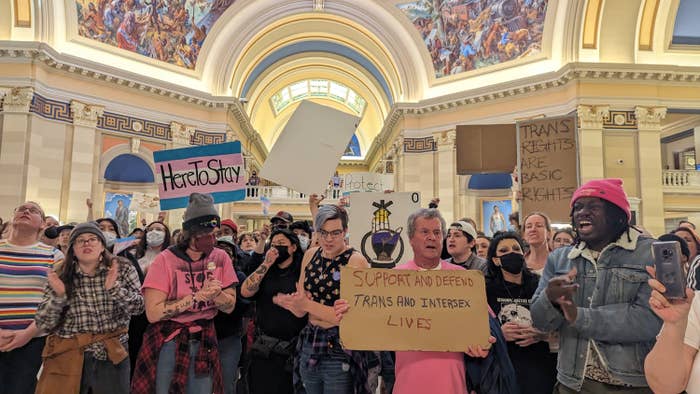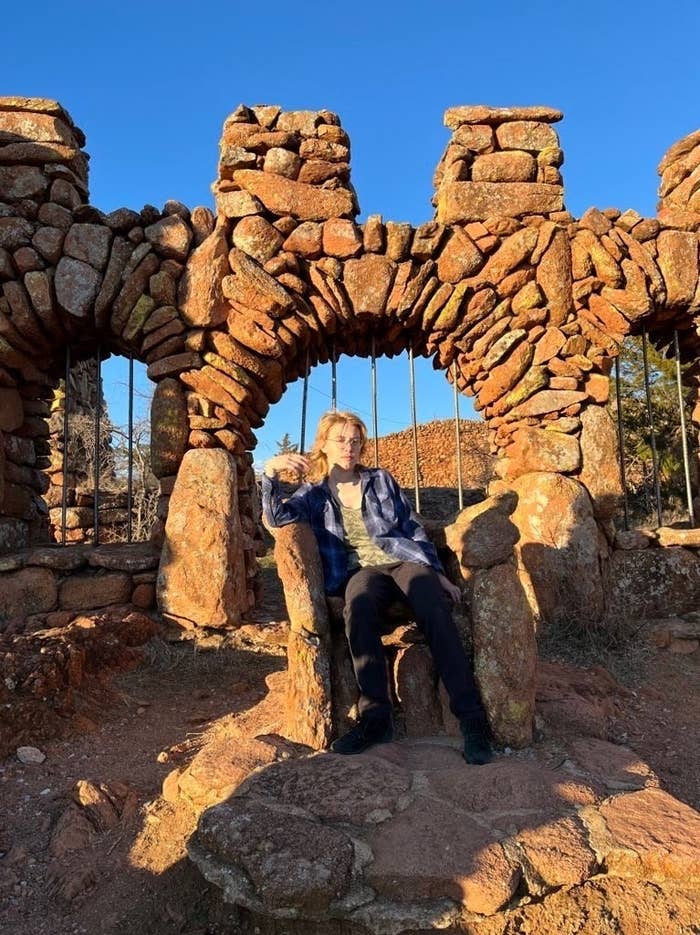
In Oklahoma, it seems like every trans person knows someone who is leaving.
For Lukas, a 23-year-old college senior, it isn’t so much a question of whether he will go, but when. Lukas, who has asked to use their first name to protect his privacy, is a nonbinary art student in the city of Norman. He’s just begun the process of trying to get a doctor to prescribe him testosterone to alleviate his dysphoria — and he dreams of one day getting top surgery.
But recently, Republicans in the state legislature introduced a bill that would force Lukas to delay getting care for years. When SB 129 was prefiled in January, it proposed a ban on gender-affirming care for anyone under the age of 26 — the first time legislation in the US has targeted access to care for trans adults.
The bill was then known as the Millstone Act, drawing its name from a Bible passage that states that it would be better to tie a stone around one’s neck and “be drowned in the depths of the sea” than to harm a child. The bill also sought to criminalize doctors and healthcare professionals for providing this care.
On Wednesday, the bill’s Republican sponsor, state Sen. David Bullard, amended the bill’s language, removing any reference to age restrictions or biblical boulders. The new text of the bill would ban the use of public funds going toward gender-affirming care — which means that trans people of all ages could face challenges seeking care at a state- or county-owned facility.
Though their access to healthcare doesn’t have an age limit on it — for now — the rise in anti-trans bills has made Lukas feel defeated and also fearful of the growing hostility against trans and gender-nonconforming people in Oklahoma. Over the last two years, they have watched as their trans friends graduate and move away to left-leaning states with better protections for trans people — and Lukas knows one day they will join in this migration.

But for now, with a good scholarship at the university and high rents outside the state, Lukas is staying put. “The general community is kind of shrinking and, as time goes on, I imagine it’s just going to get smaller after this,” he said.
Trans people across the state told BuzzFeed News the introduction of dozens of bills that target sex education, forcibly out trans youth in schools, and criminalize doctors who provide gender affirming care has already harmed the community. Many are reconsidering their long-term plans to stay in Oklahoma. Even though lawmakers have pulled back one attempt to raise the age to access gender-affirming care, it’s making a point, they said: that the rights of trans people of any age in the state are under attack.
In Oklahoma City, Nile Glover, a 30-year-old trans woman, has already made the difficult decision to flee this month with her partner, Violet, who is nonbinary. Glover said when she learned about SB 129 it felt like a warning sign. She began crowdfunding to cover moving fees after the bill was introduced last month and drove out to Colorado with her partner to look for an apartment.
“They’re very clearly coming for us specifically. We don’t want to stick around and wait for something to stick and live in whatever hellscape that’s going to be,” Glover said. She had always planned to leave Oklahoma one day, but she never imagined having to do it under these circumstances. “It sucks to be kind of ripped away from your family and everyone you care about,” she said. “We’re basically starting over. That’s very scary.”
Nicole McAfee, the executive director of Freedom Oklahoma, a Two-Spirit LGBTQ advocacy organization, believes that bills like SB 129 are proposed to intentionally appear extreme; legislators can then strike a “compromise” that doesn’t go as far as their original text. Their group is tracking at least 45 other state bills that target LGBTQ people, a dozen of which aim to restrict access to trans healthcare. Both SB 250 and SB 252 would restrict public funding for care for minors; it’s likely they’ll pass this year. Another bill, HB 1011, would ban gender-affirming care for Oklahomans under the age of 21.
The bills advancing in Oklahoma’s legislature sit in opposition to the recommendations of major medical associations that deem gender-affirming care as “medically necessary” for trans youth. The American Medical Association has repeatedly said that it is “inappropriate and harmful” for politicians to interfere with this kind of care.
“It’s especially important to make sure that people know there’s not any age when it’s appropriate to ban best practice medical care for trans folks,” McAfee said.
Oklahoma has already rolled back access to care for some trans youth. In October 2022, Republican Gov. Kevin Stitt signed SB 3, which blocked funding for gender-affirming care for minors at OU Health, the state’s only children’s hospital.
On Monday, Stitt delivered a State of the State address and made clear that restricting this care to minors was a top priority. “I’m calling for the legislature to send me a bill that bans all gender transition surgeries and hormone therapies on minors in the state of Oklahoma,” he said to a standing ovation of legislators.
Outside the state capitol building, however, dozens of protesters — everyday trans Oklahomans, organizers, and policy advocates — gathered for a rally in opposition to Stitt’s proposed future.
Protesting on behalf on trans rights in fourth floor rotunda ahead of today’s Oklahoma State of the State address.
McAfee, who joined the protesters on Monday, said it was heartening to see the community come out to support trans people. “It was so powerful,” they said. “It was joyous, so many trans folks felt so excited to see other trans people.”
Still, McAfee feels like the rest of the country has largely ignored the escalation of anti-trans policies and attitudes in Oklahoma.
“Oftentimes people look to Texas and Florida as incubators for some of the worst legislation. … Unfortunately a lot of bad ideas come out of Oklahoma too,” they said. “In a state that is perceived to be as red as Oklahoma, there’s not a lot of investment, because it’s not a place where there are easy wins on the horizon or the promise of shifting politics.”
It’s a tough landscape for lawmakers like state Rep. Mauree Turner, a Democrat and the country’s first nonbinary Muslim legislator, who wants to push for trans-inclusive policies within a Republican-controlled government. Turner was vocal in their opposition to the governor’s ban on gender-neutral markers for state documents in 2022. Turner says that one of the biggest challenges is their conservative colleagues’ lack of understanding of trans and nonbinary identities.
“Being a trans person and being on this side of the legislature, I’ve never leaned more into community and also simultaneously never felt more alone in my life,” Turner said. They said that the legislature’s current investment in rolling back trans rights distracts from important equity issues facing residents of the state.

“People’s lives and their healthcare — all of this is put on halt because of the majority of the Oklahoma legislature said, ‘Instead of making sure folks in my county have access to jobs, potable water, a living wage … the easiest thing for me to do right now is actually attack trans kids and trans folks in Oklahoma,’” Turner said.
The uncertainty and confusion of Oklahoma’s legislative session hasn’t only made some residents consider moving, it has also forced healthcare providers to have challenging — and painful — conversations with patients about what the future of trans care could look like in the state.
In Tulsa, Dr. Joshua Yap, who practices at Planned Parenthood, said many of their patients have asked about their options if this bill were to pass. In some cases, Yap said, telehealth care and front-loading prescriptions for hormones could help fill in the gaps.
The precarity of this kind of healthcare isn’t new to Yap, who remembers the last days of abortion in Oklahoma. He had to manage a massive influx of Texas patients at the Oklahoma clinic after the state passed SB 8. But unlike abortion, Yap said that gender-affirming care isn’t a onetime procedure. Patients have to get blood work every three or six months. Hormone therapy requires prescription refills, and for testosterone, which is regulated as a controlled substance, the timing can get complicated.
“In this situation, it feels a lot more long-term. It’s not just impacting them at one moment, it’s going to impact their lives for several years to come,” Yap said. “I think this would be a larger upset and destruction to someone’s life and healthcare.”
Kendall Walton, a 33-year-old trans woman, already feels that impact. After surviving conversion therapy as a teen (the practice is still legal in much of the state), she said she faced housing insecurity and job discrimination due to people’s anti-trans views. Now as an adult, she’s struggling to raise funds for breast augmentation, which she hopes to do out of state as she says Oklahoma’s surgeons often aren’t trained to care for trans patients.

Currently a college student, Walton says her younger trans classmates often joke about leaving the state for good. She said if SB 129 passes, she knows how impossible it will become for people taking hormone replacement therapy to keep up with their doses, even with telehealth filling in some of the gaps.
“It’s not like you can travel to California every three months for your blood work. That’s just unrealistic,” she said.
“We can buy cigarettes, we can buy a gun, we can buy alcohol, but we’re still not old enough to have a private agreement with our medical provider on what we want to do with our own body,” she added.
All of the uncertainty is weighing on Lukas just as he’s begun to figure out how he wants his body to move through the world. Since many of his trans friends have left the state, he tends to keep to himself, focusing on his art and cultivating his voice as a writer. Even when he rides out to Oklahoma City’s queer district, he said he can feel an undercurrent of tension among the patrons around the few LGBTQ-friendly bars and clubs.
But on Monday at the state capitol, he felt a glimmer of hope watching trans people gather in a crowd to support one another. “I didn’t have that support growing up, so it’s pretty heartwarming to see parents physically embracing their trans children,” Lukas said. “Our queer communities feel so isolated that you almost forget you aren’t the only one.”
